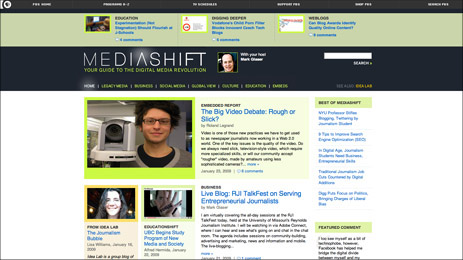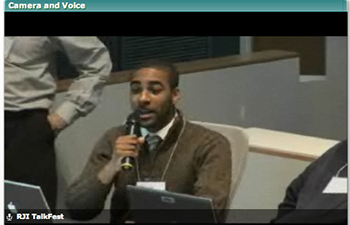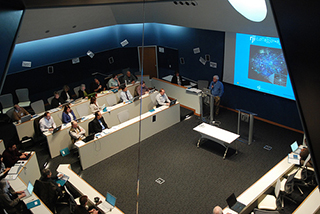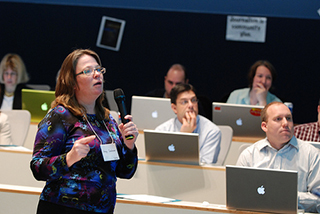
Mark Glaser host of MediaShift does live blog of RJI Collaboratory launch
I am virtually covering the all-day sessions at the RJI TalkFest today, held at the University of Missouri’s Reynolds Journalism Institute. I will be watching in via Adobe Connect, where I can hear and see what’s going on and chat in the chat room. The agenda includes sessions on community-building, advertising and marketing, news and information and mobile. The live-blogging will run chronologically downward. You can join in at the RJI Collaboratory website, where there’s a CoverItLive application that lets outside folks comment. You can also follow Reynolds Fellow and Mizzou professor Jen Reeves’ Twitter feed.
Here is the goal of the new Collaboratory:
We work with entrepreneurial journalists, citizens and organizations to create strategies and tools for high-quality web-based journalism.
Earlier transcript
I entered the Adobe Connect room late after the morning sessions had already started. Here are some good tidbits taken from the meeting notes for the morning:
Q: What can we do now that we couldn’t do before?

- User-generated content.
- Tighter relationship possible between paid journalism and contributions of citizens, previously filtered, now seen directly. Relationship is closer and contributions are more elevated in importance.
- Mobile delivery is very important — news delivery and collecting.
- Can get info from sources more quickly. More ways to tell story and give info and interact. Customize news and ads.
- User-generated content, like NYT’s reader’s photo album on inauguration
- Crowdsource, i.e. get lots of input from a wide array of places/people at once.
- Changes all the time and space constraints — instantaneous and in depth — whatever level.
- News can be reported in blogs first then packaged into fuller stories and interactives.
Q: What about the expectation of social experiences? Commenting on news stories is pretty much standard and demanded by readers.
- Hyperlink within text to infuse various levels of context into the same story for readers who do/don’t know about what is being discussed.
- We put police blotter on twice a day on Quincynews.org.
- In addition to crime stories, though, you can use databases to go back and look at wider trends
- Harness the wisdom of the masses, for example individual ratings of businesses, services, etc., aggregated into collective knowledge, such as the seller’s ratings on eBay.
Community: What can we do now that we couldn’t do before?

- It’s also easier to gather stories on one topic or area and group them into almost an online clip file.
- Making use of Facebook and other social websites to promote the site and also promote comments.
- Steve Ross says hyper-local applications in which users can recommend things to each other, like babysitters, is going to be the saving grace of news websites.
- “Citizen journalists” are great. But so are “journalist citizens.” We live in our communities, pay taxes, send our kids to school, get stuck in traffic, etc. We’re asking readers/contributors to share their lives and experiences, and we should do the same.
- The most interesting stories are the everyday ones that we as everyday people can relate to.
- Use algorithmic programming to help readers find additional content/people that would be of interest to them. Like amazon recommendations.
Marketing: What can we do now that we couldn’t do before?
- About the recommendations and customization — one possible problem is echo effect. Conceivably, we could work on countering this such as ”something important you might have missed” or ”like you, but different.”
- It seems like in some venues, ”real journalists” become obsolete. We clearly are in a new age with the technology we have but this requires us to re-evaluate the way we see ourselves as journalists and re-evaluate the way the public sees us.
- Relevance matching. Instead of having stupid ads, related to a section, every piece of content gets tagged relevant to advertisers, sponsors…More closely match ads to relevant content on page. Works well locally.
- Partner with other groups in the community that are working to build community. For example, the Missourian in Columbia, Mo., partnered with a city human rights group that already ran monthly community discussion circles to start some community conversations about media coverage, promoted the physical discussions in the newspaper and made the outcomes of those conversations available for readers.
- Advertisers can talk directly to own communities.
- Beat reporters have good potential for this. Newsrooms are filled with people who know a lot and how to find out more. Expand or add job description such as ”guide” and answer questions, etc.
- User-produced ads a la Current TV.
- Sponsorships can be expanded a lot of different ways beyond stories to beats.
The following are the notes I took after joining the session:
Jane Stevens: WestSeattleBlog sponsors events in their community. They had many garage sales going at the same time. Who would have thought of that? How can you market yourself locally.
- Host a 3-on-3 basketball tournament. It’s a necessity to have a Facebook page, a Twitter feed
- You can tap into networks of people who are interested in it.
Jane Stevens: What about mobile? What might we be able to do that we haven’t done before?
Matt Thompson: Distributed reporting. Being able to post pictures of the plane before we rescue it.

Amy Gahran: Design for the least common denominator. That’s dumb and will drive people away. Go to Chron.com [the Houston Chronicle site] which loads the simple version first. Time is a factor for mobile, and if it takes a long time to load, people will leave.
Q: Can St. Louis Beacon give examples of tapping into community?
Margie Freivogel (St. Louis Beacon): We are working on that now. We’d like to do more systematically. We do it informally by shooting out an email and link. We can see where traffic is coming from, a lot comes in because someone tapped into a link that somebody else sent them

Comments